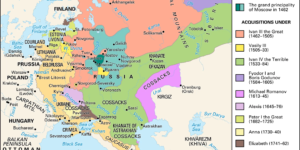Neoliberalism In Their Hearts, Proto-Fascism In Their Heads: The Political Identity Of Today’s GOP
No Comments yet Republicans have consistently adopted a reactionary orientation on race, ethnicity, and gender issues, and are fervid opponents of majority rule.
Republicans have consistently adopted a reactionary orientation on race, ethnicity, and gender issues, and are fervid opponents of majority rule.
With becoming the party of Trump, analysts have sought to come to terms with the political identity of today’s GOP. The general consensus among mainstream pundits seems to be that the Republican Party is no longer a conservative party, but has instead become something of an authoritarian outlier. Many from the progressive and radical community, on the other hand, go even further and claim that the GOP is now a fascist party.
There is a problem with both approaches to the political identity of today’s GOP. Let’s examine first the claim that Trump’s GOP is no longer a conservative party but, rather, an authoritarian outlier.
Even if we assume that the Republican party was a pure conservative party before Trump, which I take to be a highly dubious proposition for reasons to be explained further below, it should be pointed out then that, conservative parties, to a greater or lesser extent, have always been authoritarian. As such, to say that today’s GOP has become an authoritarian outlier says very little, but also fails to capture the magnitude of the change that the Republican party has undergone since Trump’s emergence on the political scene.
Indeed, lest we forget, the Republican party has been the “party of law and order” at least from the days of Barry Goldwater. And as any astute student of history will tell you, the politics of law and order (submission to authority and opposition to other groups) have always been a gateway to authoritarianism no matter the political or cultural setting. Authoritarianism and reactionism are in fact built into the fabric of conservatism.
For that matter, the Republican party has been in actuality very much a reactionary political force virtually from the early twentieth century onwards. It’s history is replete with attempts to turn back the hands of time with respect to progress made on the political, social, and cultural front. Republicans have consistently adopted a reactionary orientation on race, ethnicity, and gender issues, and are fervid opponents of majority rule.
More than a decade ago, in an interview that appeared in the British political and cultural magazine The New Statesman, the brilliant and outspoken author of the “Narratives of Empire” captured rather powerfully the state of American politics at the time by saying that what you have with the Republican party is a “quasi-fascist batch” of people, “small-town enemies of everybody” who “believe in authority…in their own mind, and no-one else’s.”
Gore Vidal was using the above terms to refer to the reaction of Republicans to the governing of the United States—a “racist country,” as he put it, that compared favorably to South Africa under apartheid—by a black president.
But that still begs the question of whether Trump’s GOP is a fascist or neo-fascist party.
Fascism is a form of government in which the ruling party not only embarks on censorship and bans political opposition, but uses the state to gain indirect control of the economy, sets all prices and wages, and controls the monetary system.
Fascism’s political economy does not revolve around the “free-market” system. Fascists not only nationalize certain industries, but compel the owners of those that remain in private hands to operate in accordance with the economic aims and goals of their government.
Fascism’s political economy stands in sharp contrast with the prevailing economic doctrine in the United States, which is neoliberalism. To be sure, there is no evidence whatsoever that the Republican party has abandoned its belief in the “free-market” system and, in turn, plans to embrace a vision of an “organized state-capitalist economy.” Neither has it become supportive of trade unions, which was very much the case with both Italian fascism and German National Socialism.
Neoliberalism, with its emphasis on privatization, deregulation, tax cuts for the rich, and massive attacks on workers’ rights, has been the economic philosophy of the GOP before and during Trump’s reign in power, and will surely continue to be so after Trump. Therefore, labelling the Republican party, with its pathological aversion to the idea of a strong central government steering the economy to help with development, as a fascist party is politically and ideologically fundamentally way off the mark. Republicans (like most Democrats since Clinton) carry neoliberalism in their hearts.
However, when it comes to politics, social and cultural issues, the orientation of the Republican party has been “proto-fascist” for quite a long time. By “proto-fascism,” I mean an ideological orientation, a state of mind, and potentially a movement whereby the political attitudes and predispositions of its members are driven by hate, social frustration and racist tendencies, attraction for the strongman and contempt for the weak, idolization of violence and rejection of reason and the values of the Enlightenment. Fear of difference is also a trait of the “proto-fascist” frame of mind, as well as obsession with a plot and conspiracy theories in general.
America’s obsession with guns, god and the flag (a uniquely American menage a trois) is in general a classic display of “proto-fascist” mentality, which is another way of saying that “proto-fascism” has been an ever present phenomenon in the nation’s political culture.
Indeed, when we consider this nation’s saga of imperialism and long-stemming traditions of militarism, misogyny, racism, gun culture, aversion to sex education, and police brutality, it is beyond dispute that the United States has had a long history of “proto-fascism.” The difference now is that it finally has managed to put all the elements together and bring about the formation of an organized “proto-fascist” political force, but one whose economic principles remain unwaveringly committed to the dogma of neoliberal capitalism and is bent on using the government to make the rich richer while weakening further workers’ bargaining power and destroying nature on the altar of profit.
In sum, the best term to use in order to capture the political identity of today’s GOP is Neoliberal Proto-Fascism. And only time, and the way the powerful socio-economic and political contradictions resolve themselves in “the land of the free and the home of the brave,” will tell whether the GOP in particular and the country in general will make the ultimate move by embracing fully the vision, the politics, and the economics of fascism.
C.J. Polychroniou is a political economist/political scientist who has taught and worked in numerous universities and research centers in Europe and the United States. He has published scores of books and his articles have appeared in a variety of journals, magazines, newspapers, and popular news websites. His latest books are Optimism Over Despair: Noam Chomsky On Capitalism, Empire, and Social Change, an anthology of interviews with Chomsky originally published at Truthout and collected by Haymarket Books; Climate Crisis and the Global Green New Deal: The Political Economy of Saving the Planet (with Noam Chomsky and Robert Pollin as primary authors); and The Precipice: Neoliberalism, the Pandemic, and the Urgent Need for Radical Change, an anthology of interviews with Chomsky originally published at Truthout and collected by Haymarket Books (scheduled for publication in June 2021).
You May Also Like
Comments
Leave a Reply








